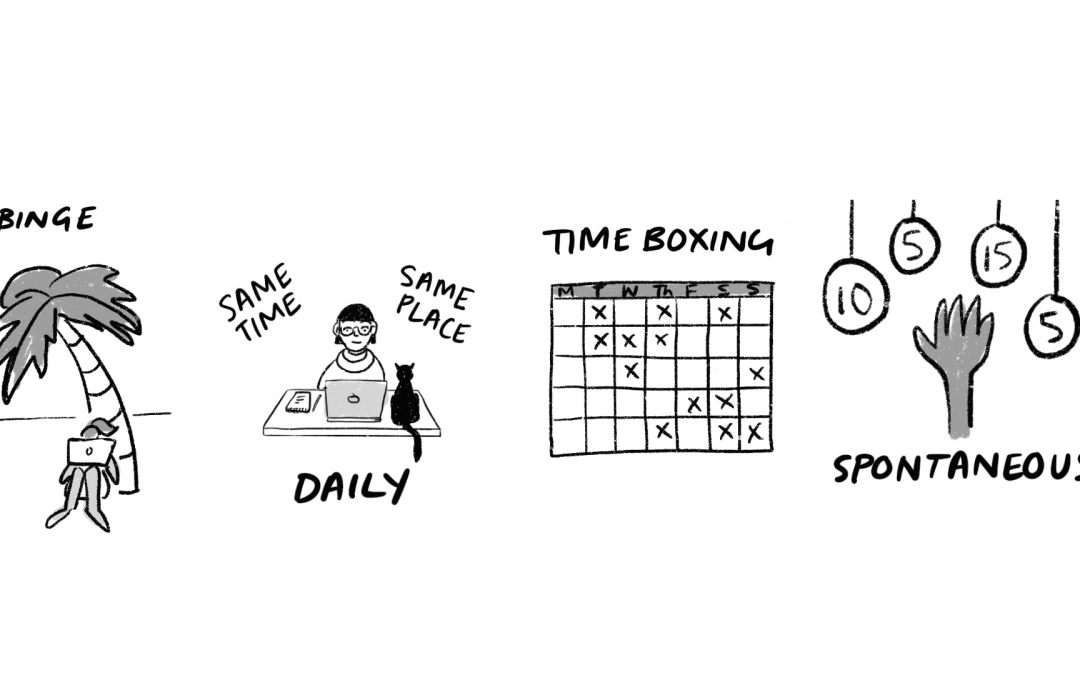Learn about four approaches that other writers use to make time to write, try these simple exercises to find time in your busy schedule, and make the most of what time you have.
How writers make time to write
Some of us are short on time while others have too much. There is no one way to be productive, your daily schedule is unique, so you need to make time to write that works in your life.
Over the last few years we’ve been asking writers how they fit writing into their lives. With over 3,500 responses to our scheduling survey we’ve found four approaches that writers take to make time for writing. These are:
- Daily : a regular writing routine
- Time boxing: scheduling time to write across a week
- Spontaneous: grabbing any opportunity to write
- Binge: rare sessions for binge writing
Find your preference
This post is will help you figure out which approach might work for you. That involves some reflection on your life as it currently is and a few exercises to experiment with different ways of finding time.
1. Self-assessment: pick an approach
So, what approach might work for you? Think about your current life situation, work and commitments. Consider which of the descriptions best describes how you typically fit writing into your life:
- Daily: “I need a daily writing habit and like the security of a routine.”
- Time boxer: “I schedule blocks of time to write across a week or a month.”
- Spontaneous: “I can write anytime, I don’t need a routine of any kind.”
- Binge: “I need long periods of time to write, I like to cut myself off from the world.”
Think about other areas of your life where you’ve achieved a big goal, changes your behaviour or completed a project – did you use one of these approaches?
Listening to your gut is a good starting point – it can align writing with our personal values and previous experiences. But we need to get specific to create a more accurate picture.
2. Reconsider how you spend your time
Look back on the past week or two to consider what’s using your time and attention. It might be helpful to grab your calendar to review what you did.
- Next, imagine you could re-live that time bearing in mind your current commitments.
- How would you re-organise your schedule? What different choices would you make?
- Were there any writing opportunities you missed? When were they?
Hindsight is indeed a wonderful thing – use it to reimagine your writing schedule. The imaginative process will create positive connections in the brain and make it feel possible to find time.
>> Read more: Prioritize your writing – make writing matter and make it happen
3. Log how you actually spend your time
Turn the previous thought experiments into a data gathering exercise.
Log how you spend your time over a week or more. Track your day-to-day activity as you do it to build up an accurate picture. Then go over your logs to re-evaluate what time you could have made for writing.
>> Read more: A guide to tracking your writing – why noticing how you write will transform your practice
4. Plan ahead – create a writing calendar
If you’ve done one or more of the exercises above, you’ll have an idea of your preference and the evidence of how you might make time to write. Whether you write every day, several times across a week or just once a month, let’s look ahead and schedule it in.
Grab your calendar, head to the internet to download a blank schedule, or draw up a grid with dates across the top and your normal waking hours down the side.
- Block out all the times you are already committed – work, childcare, socialising and exercise.
- What’s left? Are there any opportunities? If yes, book in some time for your writing like any other appointment and commit to it – whether it’s a slot every day or just once a fortnight or month. If your writing is important you must respect your schedule and show up on time and ready to write.
- Not found any time? Reschedule other tasks to free up time. What can you stop doing or delegate? Can you get up earlier, go to work later?
This is tough, but if you want to write it needs to become a priority alongside the other important things in your life.
Find out more about each writing approach
While one approach might tick all the boxes for you, remember: things will change. How you write will change over your writing life, between different types of writing, and even within the same project. You might find you use all the approaches in one project.
This was the case when I was writing my first book. I was up against a deadline to submit to the publisher but still had to work full time and juggle the other responsibilities in my life. I started by time boxing – organising scheduled writing sessions within my working day. Soon the scheduled appointments turned to a daily habit of writing before the day’s work began. But that wasn’t enough! I booked some deep work sessions where I ran away to my Mum’s house for 2-3 days of binge writing. Finally, I topped it all up with some spontaneous opportunities – train journeys were particularly productive.
Find out more below about the four approaches that writers take and experiment to see what works for you. Don’t judge yourself against an impossible standard but instead observe and learn from the experience – sometimes you’ll learn more from what doesn’t work as what does. Remember, productivity is personal!
>> Read more: How small steps lead to great progress
The daily writer has a daily writing routine
A daily writer has a regular habit, often writing in the same time and place. They like a predictable writing routine – it’s less about the amount of time they work for, and more about showing up each and every day to make consistent progress.
The regularity makes daily doers highly productive. They report feeling happier with their writing as they are in constant touch with it.
However, their love of process can mean that they resist going off on creative tangents and stepping outside a routine.
“A writer who likes regularity, structure and routine.”
>> Read more: Finding time to write: create a daily writing routine
The time boxer schedules time to write across a week
Time boxers take a realistic and practical approach to planning and getting their writing done. They look ahead a week or two and block time into their calendar for writing sessions.
By compartmentalising writing alongside their other commitments, time boxers are pragmatic and avoid feelings of overwhelm by following a ready-made schedule.
However, schedules can change and it can be hard when things don’t go to plan and life gets in the way. Also, some time boxers can be too rigid and miss opportunities outside of their appointed writing times.
“A organised writer who takes a practical approach to scheduling writing.”
>> Read more: Finding time to write: the time boxer
The spontaneous writer grabs any opportunity to write
The spontaneous writer makes the most of delayed trains, cancelled meetings and sleeping children to write. They are instinctive and can write anytime, any place, anywhere – whenever the opportunity arises.
Rather than them being impulsive or inspiration-driven, successful spontaneous writers are incredibly prepared. They have writing to hand whenever the opportunity arises. They don’t get distracted and can find their focus fast.
However, some spontaneous writers forget to step back and consider the bigger picture and struggle with organization, planning and editing. They also need to develop persistence to finish projects and can benefit from taking a scheduled deep dive.
“An instinctive writer who can write anytime, any place, anywhere.”
>> Read more: Finding time to write: the spontaneous writer
The binge writer uses longer sessions to write
The binge writer is scheduled dawn to dusk, without a gap or a moment to spare. Instead of creating a daily or weekly routine, they find time every month or so to binge write.
This isn’t deadline-driven panic-writing, but scheduled sessions of uninterrupted deep work – days that are as productive as they are rare.
However, they can be prone to raised expectations and perfectionist tendencies – craving the ideal conditions to write can induce stress and lead to panic, overwhelm and ultimately writers’ block. Research* also shows that binge writers are the least productive and more likely to feel depressed and bad about their writing.
“A writer who makes the most of rare but hyper-productive binge writing sessions.”
>> Read more: Finding time to write: the deep worker
How to make the most of your writing time
You might find you prefer one approach to making time to write, but the reality of your day-to-day life means you use a combination to move your writing forward. Be flexible, keep experimenting with different approaches, and don’t compare yourself to others or a past version of yourself.
Don’t feel bad when you really don’t have the time to write. Life will unexpectedly get in the way – feeling guilty won’t help you make progress. Instead, try a different approach, book yourself some writing time, and be twice as determined to stick to it.
Also, ask people to support you and hold you to account.
Make the most of what time you have for writing. Whatever approach you take, apply three simple rules:
- Be prepared for you writing session. Have the right tools to hand (particularly spontaneous writers) and know what you are writing next so you can hit the ground running.
- Do not procrastinate! By all means take a bit of time to warm up your writing muscles (especially if you are a deep worker) but set a time limit on your pre-writing ritual so it doesn’t get in the way of the task in hand.
- Reward yourself for the effort not the outcome. Some sessions will be better than others, so it’s important you reward the practice of making time and showing up. It will help you embed the routine and make the next session easier by knowing there’s something pleasurable waiting at the end.
If writing is important, you will be able to find time, make time and make it happen. You’ll be surprised what you can achieve, even when you’re feeling tired and uninspired.
***
Originally published on 11 October 2019, updated 8 February 2021.
*Robert Boice, Procrastination, busyness and bingeing, Behaviour Research and Therapy, Volume 27, Issue 6, 1989, Pages 605-611




